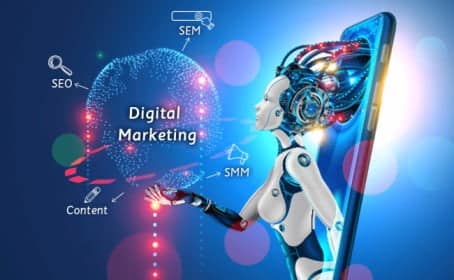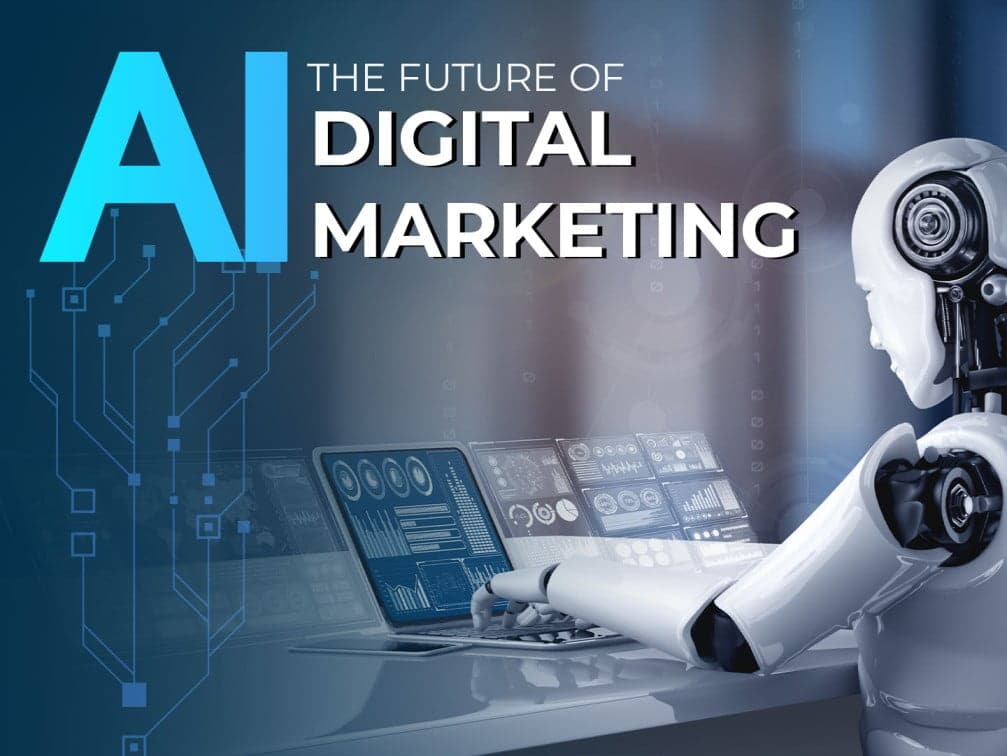Is AI the Future of Marketing

The marketing landscape is constantly evolving, and with the rise of artificial intelligence (AI), we’re witnessing a seismic shift. But amidst the hype and excitement, a critical question emerges: is AI the future of marketing? The answer, as with most things in life, is nuanced and requires a closer look.
Is AI the Future of Marketing AI’s Powerhouse Potential:
There’s no denying the potential AI holds for marketing. Its capabilities are vast, offering a plethora of advantages:
- Data Mastery: AI can analyze mountains of data, gleaning insights and patterns invisible to human eyes. This allows for hyper-targeted campaigns, personalized customer experiences, and a deeper understanding of audience preferences.
- Efficiency Unleashed: Repetitive tasks like ad targeting, content creation, and campaign optimization can be automated by AI, freeing up human marketers to focus on creative strategy and brand storytelling.
- Predictive Power: AI algorithms can learn from past campaigns and predict future outcomes with remarkable accuracy. This empowers marketers to optimize budgets, anticipate trends, and make data-driven decisions with confidence.
- Creative Sparks: AI can generate headlines, suggest content ideas, and even personalize landing pages based on individual user profiles. This opens doors to new levels of creativity and personalization in marketing efforts.
Is AI the Future of Marketing The Human Touch Remains King:
However, AI isn’t poised to replace humans entirely. Marketing, at its core, is about understanding the emotional nuances of human behavior and building meaningful connections. Here’s where the human touch remains irreplaceable:
- Empathy and Intuition: AI can crunch numbers, but it can’t replicate the empathy and intuition required to truly connect with an audience. Human marketers can tap into emotions, understand subtle cultural cues, and tailor messaging accordingly.
- The Power of Storytelling: AI can generate content, but it can’t craft compelling narratives that resonate with people on a deeper level. Human storytelling skills remain crucial for weaving experiences that inspire, engage, and build brand loyalty.
- Ethics and Transparency: As AI algorithms become more powerful, ethical considerations come into play. Human oversight is essential to ensure fairness, transparency, and responsible use of AI in marketing campaigns.
The Future: Humans and AI in Harmony:
The future of marketing isn’t about AI replacing humans; it’s about humans and AI working in tandem. Imagine a world where:
- AI handles the data crunching and automation, freeing up humans to focus on strategic thinking and creative storytelling.
- AI provides insights and recommendations, which humans then translate into compelling campaigns that resonate with their audience.
- AI tools act as assistants, augmenting human capabilities and enabling them to work faster, smarter, and more effectively.

Is AI the Future of Marketing This synergistic partnership represents the true future of marketing. Humans provide the heart and soul, the creativity and understanding, while AI serves as the brain, crunching the numbers and providing data-driven insights. Together, they create a formidable force for building brands, connecting with consumers, and achieving marketing goals like never before.
So, Is AI the Future of Marketing is AI the future of marketing? The answer is a resounding “yes, but…” It’s not a replacement for human expertise, but rather a powerful tool that, when used responsibly and in collaboration with human skill, can revolutionize the way we connect with consumers and build lasting brands.
But before diving headfirst into AI, marketers must approach it with caution and understanding. Ensure you have a clear strategy for harnessing AI’s power, prioritize ethical considerations, and empower your human team to utilize it effectively. Remember, AI is just one piece of the puzzle; the human touch remains the heart and soul of successful marketing.
By embracing this collaborative future, marketers can unlock the true potential of AI and forge a path towards a more effective, data-driven, and ultimately, more human-centric approach to marketing in the years to come.
Taking the AI Plunge: Practical Steps for Embracing AI in Marketing
Okay, you’re convinced – AI has a place in your marketing toolbox. But where do you start? Here are some practical steps to embrace AI and integrate it into your existing strategies:
1. Identify Your Goals:
Before jumping into the AI pool, define your objectives. What specific marketing challenges do you aim to address with AI? Is it improving your targeting, enhancing personalization, or optimizing campaign performance? Knowing your goals will guide your AI selection and implementation.
2. Choose the Right Tools:
The AI landscape is vast, offering a multitude of tools for different purposes. Research and compare AI platforms based on your needs and budget. Consider factors like ease of use, data compatibility, and the specific functionalities offered. Look for platforms that integrate seamlessly with your existing marketing ecosystem.
3. Start Small and Scale Up:
Don’t attempt to overhaul your entire marketing operation overnight. Begin by piloting AI in a specific area, like automating ad bidding or personalizing website content. This allows you to test the waters, gain insights, and refine your approach before scaling up to more complex implementations.
4. Embrace Data Culture:
Remember, AI thrives on data. To unlock its full potential, cultivate a data-driven culture within your organization. This involves ensuring clean, accessible, and high-quality data for AI algorithms to work with effectively. Invest in data governance and analytics skills within your team.
5. Upskill Your Workforce:
AI necessitates a shift in the skillsets of your marketing team. Equip them with training on AI fundamentals, data analysis, and ethical considerations. Emphasize collaboration between humans and AI, ensuring your team understands how to interpret AI insights and translate them into actionable strategies.
6. Track and Measure Results:
Monitor the performance of your AI-powered campaigns closely. Set clear KPIs and track metrics like engagement, conversion rates, and ROI. Continuously analyze results and adapt your approach based on data-driven insights.
7. Prioritize Transparency and Ethics:
As you leverage AI, prioritize transparency and ethical considerations. Inform your audience about how their data is being used and ensure proper consent mechanisms are in place. Uphold ethical principles like fairness, accountability, and non-discrimination in your AI-powered campaigns.
By following these steps, you can confidently embark on your AI marketing journey. Remember, AI is a powerful tool, but it’s just one piece of the puzzle. Combine it with your human expertise, creativity, and strategic thinking to unlock transformative marketing success in the AI-powered future.

